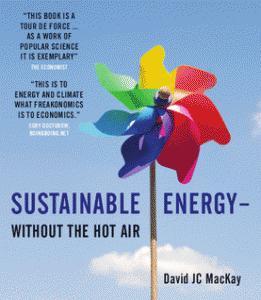 Sustainable Energy – Without the Hot Air was written by David JC MacKay, a professor at the University of Cambridge and Chief Scientific Advisor to the UK’s Department of Energy and Climate Change. This free book is available for download and was written with the mission of bringing the truth about renewable energy to the forefront. In the opening pages of the book, MacKay talks about the growing levels of “twaddle” cluttering up the discussion of clean energy development. For those of you unsure about the meaning of twaddle (as I was), it means: trivial, feeble, silly, or tedious talk or writing. According to MacKay, the conversation about clean energy is filled with twaddle – people becoming emotional, often arguing for certain solutions whose numbers really don’t add up.
Sustainable Energy – Without the Hot Air was written by David JC MacKay, a professor at the University of Cambridge and Chief Scientific Advisor to the UK’s Department of Energy and Climate Change. This free book is available for download and was written with the mission of bringing the truth about renewable energy to the forefront. In the opening pages of the book, MacKay talks about the growing levels of “twaddle” cluttering up the discussion of clean energy development. For those of you unsure about the meaning of twaddle (as I was), it means: trivial, feeble, silly, or tedious talk or writing. According to MacKay, the conversation about clean energy is filled with twaddle – people becoming emotional, often arguing for certain solutions whose numbers really don’t add up.
With this book, MacKay attempts to be straightforward and direct about clean energy. Anyone thinking public will is the only obstacle to transitioning from fossil fuels to renewable energy is greatly mistaken. The very nature of wind, solar, geothermal, hydroelectric, and biomass energy is that these forms of energy are spread out, and not nearly as energy dense as fossil fuel sources like petroleum or coal. This means larger areas are going to need to be covered in order to generate energy to offset fossil fuels in favor of renewable energy. By making this fact clear, MacKay is popping the rosy balloon that renewable energy is ready to take on fossil fuels head-to-head.
MacKay focuses primarily on the renewable energy resources available in the UK, but sets the book up so that people in other countries can do the math and find data for themselves. The availability of renewable energy for the UK leaves much to be desired, and MacKay makes the point that even without considering the economic costs of large-scale renewable energy projects, the UK most likely doesn’t have enough resources to generate its own clean energy. This conclusion means that simply building up renewable energy won’t bring total clean energy to the UK.
This book isn’t fighting against the development of renewable energy. I understand how easy it can be to think that MacKay is anti-renewable energy, and that this book is his way to influence others to fight against renewable energy. But that is simply not the point of this book. MacKay wrote this book with the intention to educate people on what our current levels of energy consumption look like, and what we will need to accomplish to convert to clean energy. Renewable energy already has a tough enough future ahead of it and doesn’t need environmentalists wrongly expecting renewable energy to explode and take out fossil fuels. Renewable energy needs all the help it can get to grow, and it will take smart people realizing that everyday habits are going to need to change if we ever hope to bring renewable energy to the top of the world energy portfolio.
Image source: http://www.withouthotair.com/images/NewCover09b.gif

